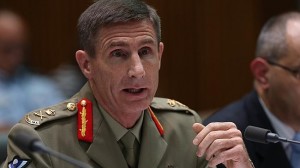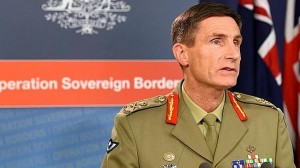LABOR defence spokesman Stephen Conroy is clinging to his job after refusing to apologise to the decorated Army General he accused of conducting a political cover-up.

During a Defence Estimates hearing on Tuesday Senator Conroy deeply offended the commander of Operation Sovereign Borders, former SAS officer and Afghanistan war commander Lieutenant General Angus Campbell, by calling into question his integrity.
The government’s day two charge against the Labor head kicker was led by Prime Minister Tony Abbott who demanded an apology for the “brain snap”.
“I think that uniformed officers of our country should be treated with our deep respect,” Mr Abbott said.
The issue escalated into a full-blown political debate when former army officer and Independent Tasmanian MP Andrew Wilkie, who opposes the government’s policy, moved a motion in the House of Representatives to “admonish’’ Senator Conroy for attacking General Campbell’s integrity.
Mr Wilkie, who was at Duntroon with General Campbell in 1984, said he was disappointed that the debate became so political and that his motion was opposed by Labor.
The motion was seconded by Foreign Minister Julie Bishop who described the Conroy attack as a “despicable slur”.
“If he [Senator Conroy] does not [apologise], the leader of the opposition should remove him from the role of shadow minister for defence. He is unfit for that role,” she said.
Predictably it was opposed by Labor on party political lines with Opposition leader Bill Shorten accusing the government of using the general as a political football and of smearing the military.
The motion was carried on the voices.

In an unprecedented intervention, the Chief of Defence General David Hurley used a Senate Estimates hearing to defend the man he promoted to three-star status to take the Operation Sovereign Borders Job.
Treading a fine political line given the sensitivity of the issue, General Hurley said he was pleased that the accusations were withdrawn.
“But unfortunately once said the shadow will linger,” he said.
“Lieutenant General Campbell has a reputation in Canberra, more widely in Australia and overseas, of integrity, intellect and studied impartiality.”
A visibly subdued but unrepentant Senator Conroy told the Senate that he was not criticising General Campbell for simply following orders.
“No Australian wants to see the politicisation of the military,” Senator Conroy said.
He then spent several hours trying to pry political answers from senior defence officers about Operation Sovereign Borders.
General Hurley and Navy chief Vice-Admiral Ray Griggs refused to answer dozens of questions instead referring Senator Conroy to “`on water matters’’ and the minister in charge, Immigration Minister Scott Morrison.
During his opening remarks General Hurley also revealed that Australia’s main base in the Middle East at Al-Minhad Air Base (AMAB) near Dubai would be named Camp Baird in honour of the nation’s latest Victoria Cross winner Commando Corporal Cameron Baird who was killed in action last June.
About 400 Australians are based there to support another 400 still serving in Kabul and Kandahar in Afghanistan.
Defence Minister David Johnston squashed rumours that the navy’s two new 27,000 tonne amphibious landing ships would be based at Townsville and not Sydney.
“It will be Garden Island [Sydney],” Senator Johnston said.
ATTACK HAS BROUGHT OUT THE BIG GUNS Comment Simon Benson
STEPHEN Conroy is rapidly running out of friends in the Labor caucus. And so too will Opposition leader Bill Shorten if he doesn’t do something about him.
A growing number of senior Labor MPs believe Conroy should resign — and if he doesn’t, Shorten should sack him.
His attack on General Angus Campbell was unbecoming of someone with ambitions of becoming Defence Minister.
But it was the Chief of the Defence Force’s response that is more problematic for Conroy and ultimately Shorten and the Labor party itself.
General David Hurley’s public admonishment of Conroy in defending the integrity of one of his most senior officers was without precedent.
It signalled that the senior brass of the ADF have no confidence in the man.
“Once said, the shadow will linger,” he said of Conroy’s accusations that Campbell was involved in a government cover-up on border protection.
What General Hurley was saying was that Conroy’s attack will not be forgotten.
For that reason alone it is almost impossible for Conroy to ever be considered for a role as Defence Minister in a Labor government.
But it is deeper than that for Shorten’s attempts to show leadership.
Shorten needs to demonstrate that he has control over one of his Victorian numbers men — one who is out of control and prepared to engage in factional bully-boy tactics with the military.
Some senior Labor MPs believe Conroy should never have been given the job and it should have gone to David Feeney.
Many had even hoped he would have left parliament at the election, such was the toxicity which many colleagues believe he brings to a factionally fragile Labor caucus.
His behaviour also blunted Labor’s attempts yesterday to force the sacking of assistant health minister Fiona Nash. And there are many of Conroy’s mates who aren’t at all happy about it.





Comments are closed.